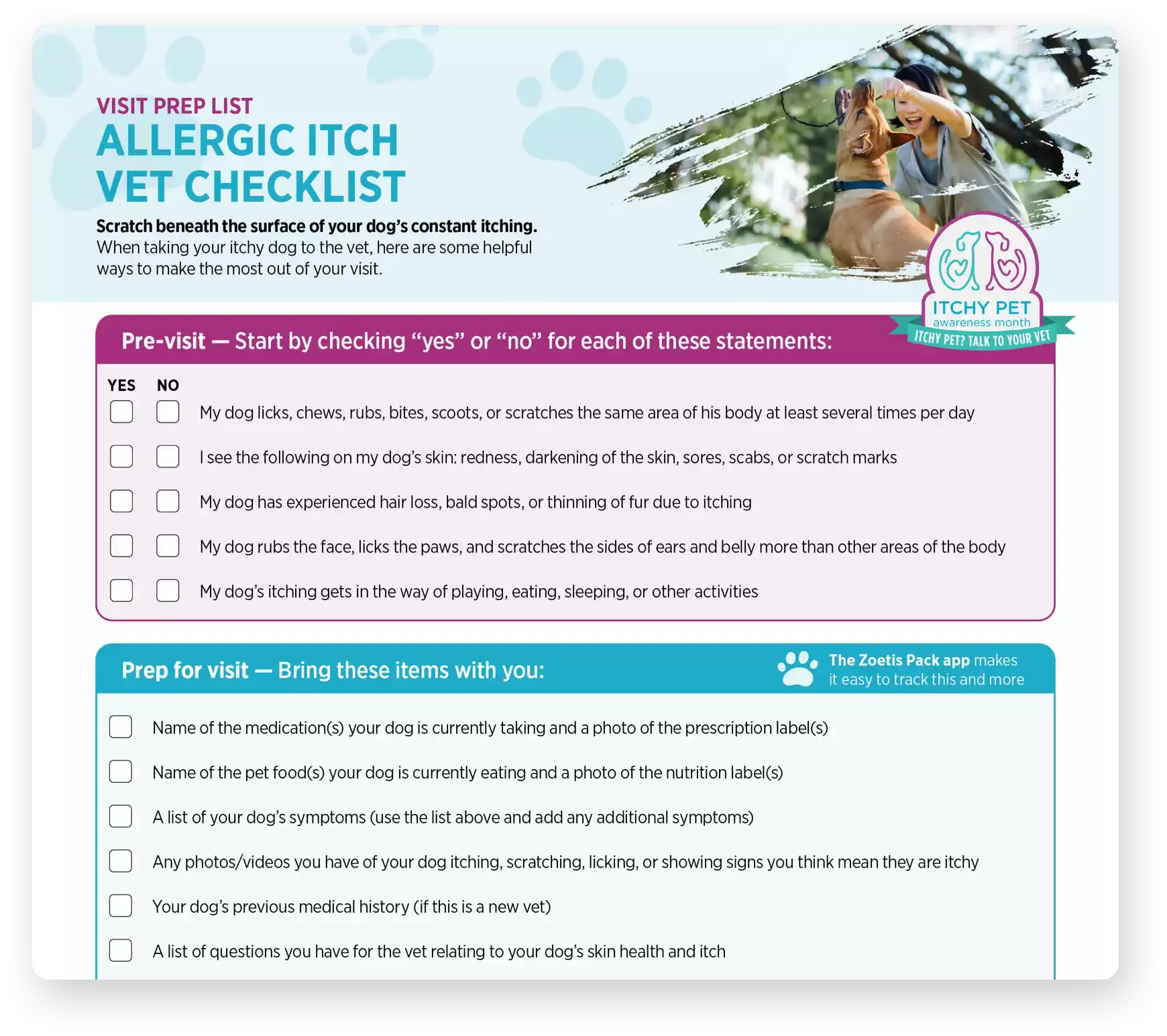Scratch Beneath the Surface of Allergic Itch
August is Itchy Pet Awareness Month — a time dedicated to helping you learn more about allergic itch. Sometimes, what looks like typical dog scratching may be a serious medical condition known as dog allergic itch or allergic dermatitis.

Scratch Beneath the Surface with the Facts



Could Your Dog Have Allergic Itch?
There are clear signs of allergic itch that are often mistreated or missed:
Don’t Wait to Treat Your Dog’s Allergic Itch
- Continued itchiness, discomfort, and even pain from scratching-induced skin damage
- Hair loss, redness, odor or sores
- Secondary bacterial or fungal skin infection
- Disruption of normal activities for both dog and owner

Scratch to Reveal the Facts of Allergic Itch
When it comes to allergic itch, it's sometimes hard to know what's a good approach or bad approach.
Test your knowledge to see if you’re an expert in spotting a good approach or a bad approach for allergic itch.

Understand the Itch
If your dog is itchy, you might think it’s seasonal, or “it’s a phase.” Maybe you’ve tried a home solution, but it only worked temporarily. Solving the problem starts with understanding the cause. Check out some reasons your pet may be itching and be sure to talk to your vet if any of them sound familiar.
Allergic Dermatitis
Flea Allergy
- An allergic reaction to flea bites that cause inflamed and itchy skin, hair loss, and scabs on the dog’s skin
- The hind end, tail base, and thighs are most commonly affected, but lesions (skin changes) can develop anywhere on the body
Food Allergy
- Occurs when a dog’s body is allergic (or overly reactive or sensitive) to something in their diet
- Itching often involves the face, armpits, belly, and feet
- Skin infections as well as irritation and infection of the ears are common
- Dogs may have gas, increased bowel movements, or loose stools
Environmental Allergy (atopic dermatitis)
- Occurs when a dog's body is allergic (or overly reactive or sensitive) to pollens, dust mites, or mold spores
- Affected dogs often have itching, redness, and hair loss of the face, undersides, and feet
- Skin and ear infections occur frequently and ear rubbing or head shaking are common
Contact Allergy
- An allergic reaction to something that touches your dog’s skin
Other Skin Problems
Bacterial Infections
- Can occur when a dog’s skin is inflamed and irritated due to scratching from allergic skin disease, or if their immune system is compromised
- Bacteria can multiply, leading to infection
- Signs include skin redness, crusts, scabs, rash, and pimples
Yeast Infections
- A type of fungal infection often seen in dogs with allergic skin disease
- Affects folded areas of the skin, such as face and lip folds, ears, under the neck, between the toes on paws, and under the tail
- Skin is often greasy, red, thickened, and has an odor
Hot Spots
- Focal areas of intense irritation that lead to redness and oozing
- Can appear very quickly and cause discomfort
Options for Treating Allergic Itch at the Source
Solutions Start With the Right Conversation
Getting your dog the right treatment early can help relieve the signs of itching quickly and avoid unnecessary costs and suffering. It starts with the right conversation with your veterinarian.
Download the Vet Visit Checklist and bring it filled out to your next appointment to help you get answers, and treatment, fast.

References:
- Chronic vs. Acute: The Most Frequent Diagnoses and Their Costs. Nationwide Mutual Insurance. Published March 19, 2025. Accessed April 7, 2025. https://news.nationwide.com/chronic-vs-acute-the-most-frequent-diagnoses-and-their-costs/
- Data on file, Pet Owner Quantitative Market Research, 2013, Zoetis Inc.


